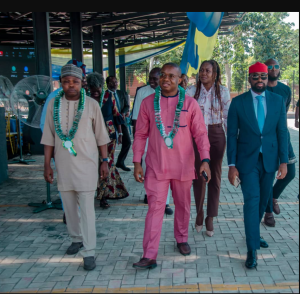

Nkasiobi Oluikpe
“It is in justice that the ordering of society is centered.” — Aristotle
Questions are being asked as to whether the Nigerian State joined the rest of the world to celebrate the World Day for Social Justice (WDSJ) this passing week. Justifiable as it seems, the truth remains that Nigeria does not need to throw an open party to join in the celebration.
Its membership of the United Nations, automatically makes it a participant in the celebration. However, like what the late Afrobeat legend, Fela Anikulapo Kuti, sang, Nigeria’s kind of participation can only be best described as ‘Follow, follow’, just to tag along and fulfill all righteousness. A passive participant that is to just join the chorus. Not that they abide by the principles of social justice or even believe in it.
The reasons are clear. If social justice as defined by the United Nations, is the view that everyone deserves equal economic, political and social rights and opportunities, then where does Nigeria stand on this?
Social justice, which can be summarized to mean promotion of fairness and equity across all aspects of society, can only thrive in a truly democratic system, which Nigeria claims to practice. Ironically, though Nigeria claimed to have practiced democracy for an onward of 24 years (1999 till date), its democracy is still being described as nascent. A case of a 24 year old man still being referred to as a toddler.
Though social justice is all encompassing as people are expected to practice it in their individual corners and private lives, basically, it is the responsibility of the government on its citizenry. Where social justice is lacking, social oppression is manifest.
We are talking about a system that promotes fairness in wealth distribution, fairness in public appointments, fairness in the provision of basic needs, equal opportunity for all, respect for human rights, protection from any form of discrimination and government being accountable to its citizens.
People having access to basic amenities irrespective of social class. These include good education for all; availability of housing privileges; access to good healthcare, availability of functional infrastructures and government being conscious of its social contract with the people because they are aware that people have a right to protest against every anti-people policy and demand explanation. Above all, in a country where social justice is practiced, poverty is eradicated and the disparity or gulf between the rich and the poor is not too extraordinarily wide. Government exists for the people and not the other way round.
Even the 1999 Constitution gives legitimacy to social justice by institutionalizing the principles of justice, equity, freedom, liberty, transparency in government….according to which a good government must be run.
So having outlined what social justice implies, what is Nigeria’s scorecard on this and why are the questions, as to whether Nigeria participated in the exercise, being asked. Here are some reasons:
Since the inception of this Fourth Republic, and especially, this current administration, Nigeria’s democracy has more likely promoted inequality and social injustice in various aspects of its public life.
There is no other place that the cliché that some animals are more equal than the others practiced more than in Nigeria. Some sections of the country are termed untouchable while the others are treated with disdain.
Take for instance, In the year 2000, Lanre Shittu, a Lagos auto dealer was hurriedly extradited to the US on charges bordering on money laundering and illicit drug deals. Investigation revealed that the extradition had the approval of then President Olusegun Obasanjo.
However, in 2021, a similar scenario played out against a now suspended Deputy Commission of Police, Abba Kyari, over the same offences of money laundering and drug trafficking. Despite the call for his extradition to the US and the general outcry generated by the allegations against him, the powers that be, used the instrumentality of the Federal High Court in Abuja to shield him from extradition.
This led Nigerians to question as to why the same law cannot be applied to all the citizens and if the country operates different laws and justice systems for different regions within the same country.
Another is that the country is blessed with different kinds of mineral resources. However, the administration of these resources is skewed to favour some sections of the country against others. The Niger Delta is the goose that produces the golden egg that sustains the entire nation. The crude oil in the Nigeria Delta is the mainstay of the Nigerian economy.
The process of drilling and refining this natural crude is such that it inflicts a lot of environmental hazards on host communities. However, despite that, they cannot boast of control over the resources.
However, in states like Zamfara and Borno, where there are lots of solid minerals, private individuals are licenced to mine them and keep the proceeds for themselves to the exclusion of the rest of us. Where is the justice here, where is the equity and where is the fairness as enshrined in the Constitution.
Also, the tenets of inclusiveness which social justice propagates is not reflected in Nigeria’s democratic system because of the ethnic biases against a certain region. The essence of the federal character principle is to ensure that in power relations and power sharing, government’s decisions on citing industries, building roads, awarding scholarships, recruitment or appointment or employment of public office holders, admission and revenue allocations, etc. reflect federal character. Section 14(3) of the 1999 Constitution supports this:
“The composition of the Government of the Federation or any of its agencies and the conduct of its affairs shall be carried out in such a manner as to reflect the federal character of Nigeria and the need to promote national unity, and also to command national loyalty thereby ensuring that there shall be no predominance of persons from a few states or from a few ethnic or sectional groups in that government or in any of its agencies.”
However, despite enshrining the above in the Constitution, for the reasons best known by the handlers of the Nigerian State, there is an obvious geopolitical imbalance in power sharing in the system as one ethnic group have been benched while the others recycle the power amongst themselves.
Again, one of the principles of social justice is the right of the people to protest and hold rallies against any perceived form of injustice. Ironically, in October 2020, innocent youthful protestants were shot for calling for an end to police brutality.
How about appointment into the various arms of the military and admission into the higher institutions? All these are skewed to favour a particular region to the exclusion of the rest. The list goes on and on.
The inability of the Nigerian political system to adhere to social justice in its administration of public affairs ridicules and makes laughable, their involvement in the celebration of the World Social Justice Day.











